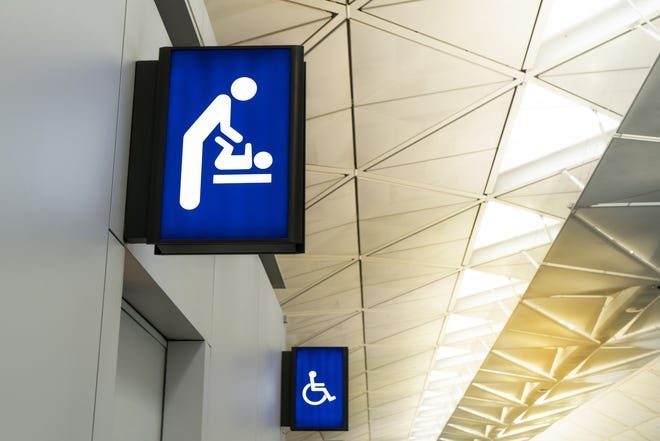A slew of state laws take effect in 2020 – ranging from mandatory composting to child abuse registries to access to diaper changing stations. One state will even begin banning expiration dates for gift certificates.
A few of the more notable changes:
Vermont rolls out mandatory composting
Food scraps can’t go in Vermont landfills beginning July 1. Residents will have four ways to handle rotten leftovers and items such as peels, eggshells, seeds, pits, coffee grounds and oils, according to the state’s environmental conservation department.
Vermonters can use a household compost bin, buy a Green Cone solar digester to break down the scraps, feed scraps to pigs or leave it to the composting professionals. The universal recycling law will require trucking companies to provide food scrap collection services to nonresidential customers and multi-unit apartment complexes, the Burlington Free Press reported.
Restaurants, supermarkets and cafeterias must also comply with the law, which is the first state law of its kind. The state hopes to reach a 60% recycling rate through mandatory composting.
Arkansas bans state-funded human cloning
Citing a need to respect human life, Arkansas will not allow public funding for human cloning or “destructive embryo research,” which the state defines as medical procedures or investigations that kill or injure developing humans. ACT 653 also blocks state funds from stem cell research involving embryos, the stage lasting to eight weeks after fertilization.
Under the law effective Jan. 1, no state educational institutions can do human cloning for scientific research, either. It does not block state funds from in vitro fertilization.
Washington stops gift card expiration dates
Businesses in Washington state will be prohibited from putting expiration dates on gift cards beginning July 1. HB 1727 will also prevent gift certificate users from being hit by inactivity or service charges.
However, if a gift card is part of rewards or loyalty program, it can still expire. The law will also not apply to gift certificates given to charitable organizations as a donation.
Illinois requires diaper changing stations in many restrooms
Restaurants, stores and other buildings with public restrooms in Illinois must have at least one baby diaper changing station under HB 3711. Effective Jan. 1, the law requires buildings either have a station in both a women’s and men’s restroom, or a station in a unisex restroom. Building owners must also display a sign near restroom entrances to show that a sanitary and safe changing station is inside.
Diaper duty:John Legend speaks out about why he changes diapers
Exceptions to the law include bars and nightclubs that don’t allow minors, as well as cases where adding a station isn’t feasible or would prevent people with disabilities from navigating the restroom.
In federal buildings, the Bathrooms Accessible in Every Situation (BABIES) act already requires diaper changing stations in men’s and women’s restrooms. California has a law similar to Illinois, while New York requires stations in new or renovated public restrooms.
Nevada prevents denying coverage for preexisting conditions
At the beginning of the new year, Nevada will join a dozen other states in preventing insurers from denying coverage to patients because of preexisting conditions. The federal Affordable Care Act currently protects people with preexisting conditions from that and higher coverage costs, but the act is facing legal challenges. A federal appeals court struck down a major part of the ACA last week, which could lead to a Supreme Court case.
‘Unconstitutional’:Federal appeals court strikes down key part of Affordable Care Act
Democratic Gov. Steve Sisolak said Nevada’s AB 170 will keep health care protections in place if the ACA is eliminated. States with similar protections in place for preexisting conditions include Delaware, Hawaii, Indiana, Maine, New Hampshire, New Mexico, Oregon, Vermont and Washington, according to the Commonwealth Fund.
Georgia tightens child abuse registry requirements
In Georgia, HB 478 will create stricter requirements to list a person on the state’s child abuse registry, upping the age from 13 to 18. Previously, the state entered offenders who were minors into the database and didn’t remove them until they turned 18, could prove they had been rehabilitated or more than a year passed since the date of the act that prompted the last case.
Effective Jan. 1, the law also updates the process to get a name expunged from the state registry. If a judge refuses to remove an offender from the registry after a hearing, the offender can request another three years later.
The state established the registry, which the public cannot view, in 2016. Each year, the state receives about 140,000 reports of child maltreatment, according to the Georgia Division of Family and Children Services.
New Jersey outlaws salary history inquiries
Employers cannot screen applicants based on their salary history under a New Jersey law effective Jan. 1. AB 1094 also prevents hiring managers from requiring that an applicant’s salary history falls within a minimum or maximum criteria.
If a worker voluntarily provides his or her previous salaries, wages or benefits, employers can use the information to determine compensation, however. More than 15 other states, including California, Hawaii and Maine, have similar bans on salary history screening, HR Dive reported.
 Mix 102.7 WCPZ Mix 102.7
Mix 102.7 WCPZ Mix 102.7


